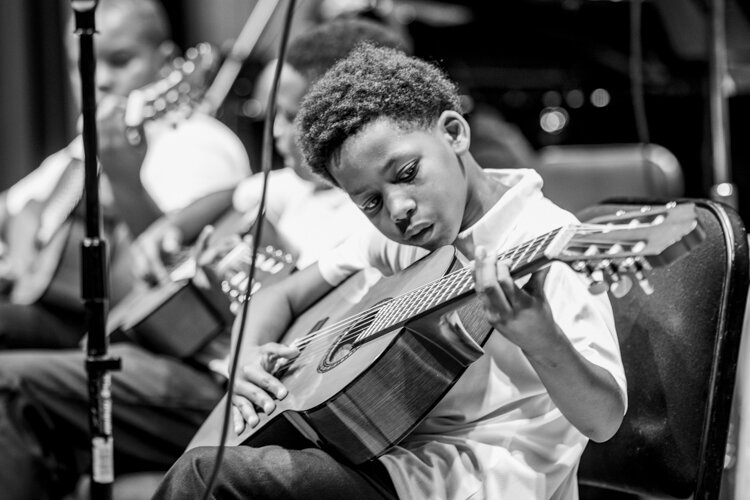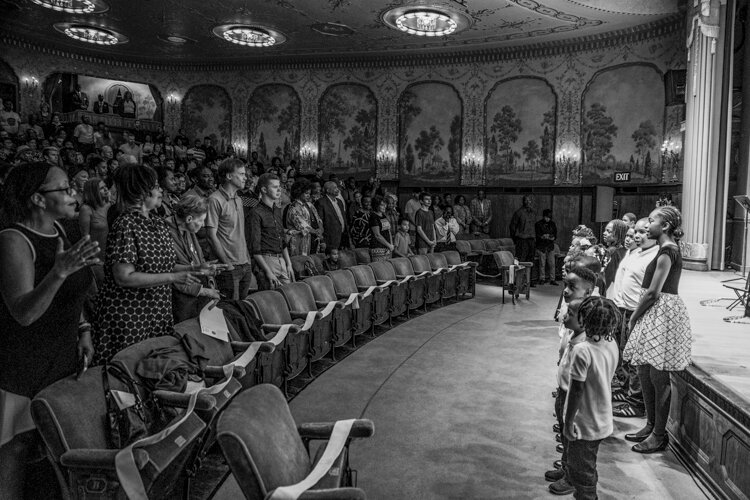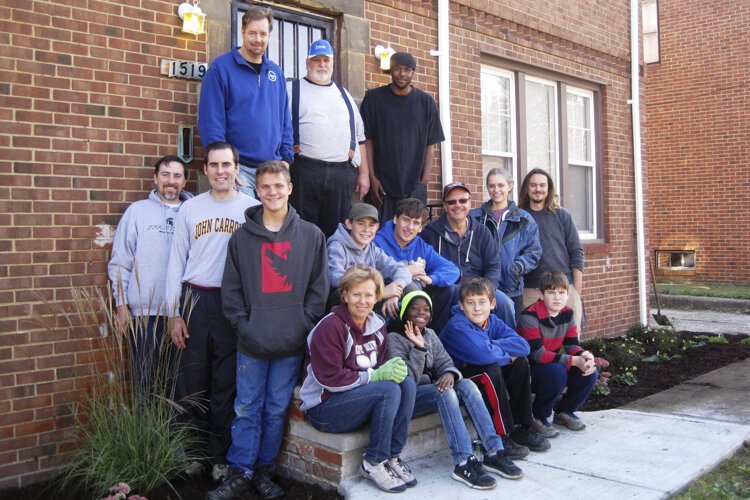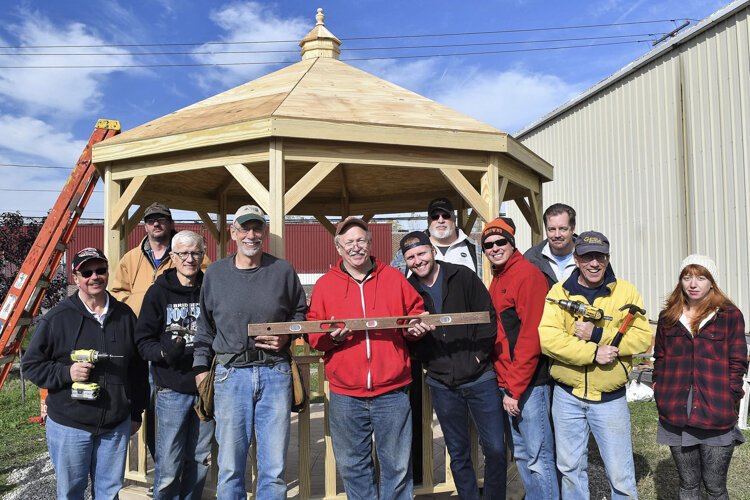Meet six Fresh Innovators who are using their grit to make Cleveland great
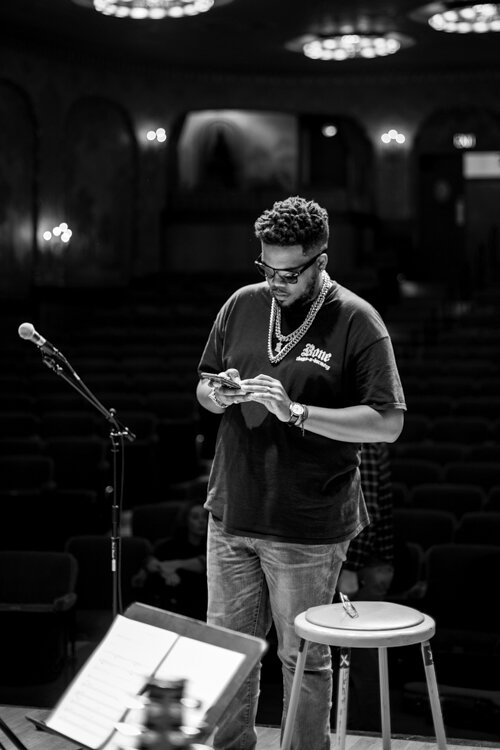 Archie Green performs with Lexington-Bell students at "My Violin Weighs A Ton" at Severance HallArchie Green, founder of Peel Dem Layers Back and My Violin Weighs a Ton
Archie Green performs with Lexington-Bell students at "My Violin Weighs A Ton" at Severance HallArchie Green, founder of Peel Dem Layers Back and My Violin Weighs a Ton
Archie Green has struggled with depression for most of his life, but he didn't always realize it. In 2014, the rapper was clinically diagnosed and started therapy.
The experience changed his life—prompting Green to write his song “Layers” about the positive impact therapy had on him. The song went viral and Green found himself in a new career as a mental health advocate. In 2016, he founded Peel Dem Layers Back (PDLB).
“I founded Peel Dem Layers Back as a mental health awareness vehicle utilizing hip-hop culture as a means to break the stigma,” explains Green. “What continues to motivate me to do this work is the importance of this conversation and the lack of common knowledge on the subject in the Black community.”
Green says the work he and his team are doing has already had an impact—especially in encouraging Black men and boys to process and express their emotions and bond with one other.
Last year, Green took his work to the next level with My Violin Weighs a Ton (MVWAT)—a four-month performance art project in tandem with the Lexington-Bell Community Center in the Hough neighborhood, as well as the Cleveland Orchestra and the Cleveland Classical Guitar Society. The project implemented classical guitar lessons for students aged four to 14.
"The vision for PDLB is a world where Black men and boys are able to creatively cope with trauma, positively express emotions, and foster community with others through healthy relationships with self, partner, family, and protective relationships with the world,” explains Green. “The work that I am doing with My Violin Weighs A Ton helps me with that vision by introducing something new—learning a classical instrument—and something familiar—playing a popular hip-hop song—at the same time while addressing areas of mental illness with Black youth.”
Green says the program addressed acts of kindness, social anxiety, and parental engagement. At the program's conclusion, MVWAT hosted the first-ever hip-hop concert to take place at Severance Hall. Adds Green, “This was also one of the most diverse [groups] that the venue had seen since it opened its doors in 1931.”
Next, Green plans to raise additional funds to hire staff and expand the reach of Peel Dem Layers Back, while also earning 501(c)(3) status. Green also has set a goal to get "500 people in the Black community [certified in] mental health first-aid” in partnership with South Euclid United Church of Christ and NAMI Greater Cleveland.
In his free time, the Shaker Heights resident enjoys listening to and making music, and spending time with his wife, family, and friends.
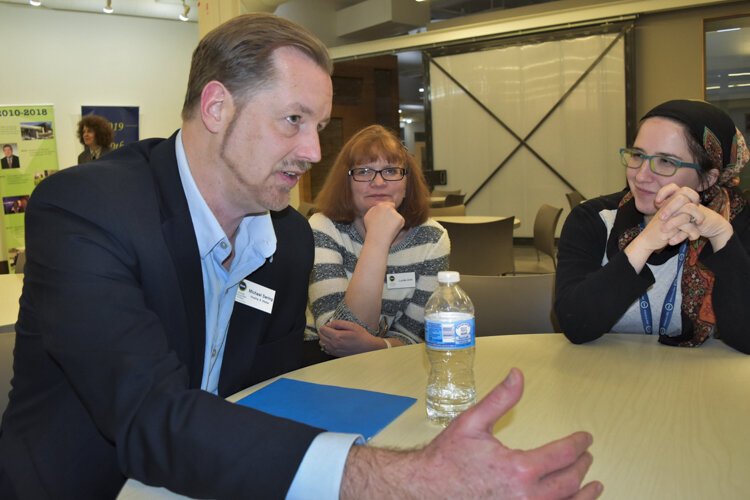 Michael Sering, vice president housing & shelter, Lutheran Metropolitan Ministry, with staff partners describing new initiatives.Michael Sering, vice president housing & shelter, Lutheran Metropolitan Ministry
Michael Sering, vice president housing & shelter, Lutheran Metropolitan Ministry, with staff partners describing new initiatives.Michael Sering, vice president housing & shelter, Lutheran Metropolitan Ministry
As a youngster, Michael Sering knew the positive feeling of giving back. “I grew up in an activist household with my parents having me volunteer with them in a nursing home at the age of four—before I even knew what was going on,” he recalls.
That early exposure carries into his daily work with Lutheran Metropolitan Ministry (LMM). With an undergraduate degree in economics and an MS in social administration, one of Sering’s goals has been to implement both planning and innovation for underserved populations and progressive social causes—primarily to end homelessness.
Sering has a big challenge in meeting that goal. LMM operates 2100 Lakeside—the largest homeless shelter in Ohio.
“It can be overwhelming to think about ending homelessness for such big numbers,” he says. “If you break it down, though, it can be done—most of the guys figure out housing on their own, [and] many get housed through existing partners, so the unmet need gets to a manageable number.”
Sering has managed to further reduce homelessness through the creation of programs and partnerships that create affordable housing options for people who might otherwise be living on the streets or in shelters. For instance, LMM partnered with the Cuyahoga Land Bank to renovate a Cleveland duplex—creating a home for six people with six bedrooms and shared common areas on both sides of the duplex. Rent (including utilities) is $373 per month—making the house affordable for people with low incomes while not requiring government subsidies.
“It’s technically called ‘shared housing,’ but it’s basically having roommates to keep the costs down for people leaving homelessness,” explains Sering. “It’s permanent housing, but some people move out over time. In the last five years, out of 20 people, only one has returned to homelessness.”
In light of the first house's success, LMM is replicating it with a second duplex. “I am focusing on the gaps, piloting solutions that could be replicated to help complete the full picture,” says Sering. “We are also addressing family homelessness by rehabbing vacant houses with the Land Bank.”
Sering says he is most excited about LMM’s current $3.5 million affordable housing initiative, the Breaking New Ground capital campaign. Part of the money raised in the campaign will go to a Family Stability Fund, through which LMM can offset some rent when a parent hits a bump in the road here or there. The organization has raised $2.1 million to date.
“These ideas are ripe for scalability after further demonstration of success,” says Sering, adding that it can be tough sometimes to start optimistic when they hit roadblocks. “But I’m full throttle and want to see this happen.”
Additionally, Sering says there are new construction techniques and strategies he is eager to try in his quest to eliminate homelessness. For instance, he says they are currently working with a partner who can build the shell of a house in 24 hours, at half the cost, using additive manufacturing techniques. “We want to bring that to Cleveland, as well as 3-D printed houses as the final piece to the homeless puzzle,” he says.
At the end of the day, Sering credits both the people he works with at LMM and the people he serves with his successes. “I love my job,” he says. “I am humbled to serve people who have so much potential and just need the right opportunity, and I am energized to do that with amazing staff partners.”
 Cait KennedyCait Kennedy, co-founder and executive director of [unBail], Ph.D Student at Cleveland State University’s Levin College of Urban Affairs
Cait KennedyCait Kennedy, co-founder and executive director of [unBail], Ph.D Student at Cleveland State University’s Levin College of Urban Affairs
Social justice causes course through Cait Kennedy’s veins. After graduating from college, she became a “campaign mercenary,” living in five states in four years before returning to Cleveland and working for MoveOn.org. Kennedy earned her master’s degree in urban studies and policies from Cleveland State University, and now attends the Levin College of Urban Affairs Ph.D program.
“My passion really lies at the intersection of how to make our institutions more democratic and representative of the community,” she says.
While pursuing her degrees, Kennedy has been involved in several projects: Co-founder and executive director of [unBail], a mobile app to help defendants navigate Cleveland’s legal system; a “Smart City Catalog Project” to help public service organizations collaborate better; and the “Filer Voter 2020” project measuring the effectiveness of offering voter registration to low and moderate-income households when filing taxes.
The [unBail] program took off after Kennedy and her team earned first place at Hack Cleveland’s 2016 Scope-A-Thon. “We did not attend this Scope-A-Thon thinking we would leave as social impact entrepreneurs,” recalls Kennedy.
Since then, [unBail] has received funding from the Cleveland Foundation, filed as a 501(C)(3) organization, and teamed up with Anthony Body of The Bail Project.
The group has been mapping possible outcomes through the court system, looking at the different scenarios involving bail or bail denial, and working on launching an app for defendants to successfully navigate the courts and bail hearings. “To me, this started on a personal level with a system that’s deeply unfair,” says Kennedy. “Black people make up 13% of the population and 40% of the prison population—that’s horrifying.”
Kennedy then got involved with Smart City Catalog after working with Nicholas Zingale from the Internet of Things (IoT) Collaborative to assess the landscape of smart city projects and look at how the public sector can work better together to solve problems.
She is also working on the Filer Voter 2020 Project, which works with Volunteer Income Tax Assistance (VITA) locations to register people to vote. “We’re actually moving into Filer Voter 2.0,” says Kennedy. “We’ve also added the component of postcards to remind people to vote [when they’ve registered].”
These three programs are exactly what motivates Kennedy to keep moving forward.
"I am motivated by a deep belief in democratizing access to voting and information about the legal system,” she says. “To me, these are not only fundamental human rights but rights that are enshrined in our country's founding documents. The founders made sweeping declarations about who is entitled to life, liberty, and the pursuit of happiness, but those were only guaranteed for some.
“I'm drawn to projects and causes that open up those fundamental rights to those who have been historically denied them. “
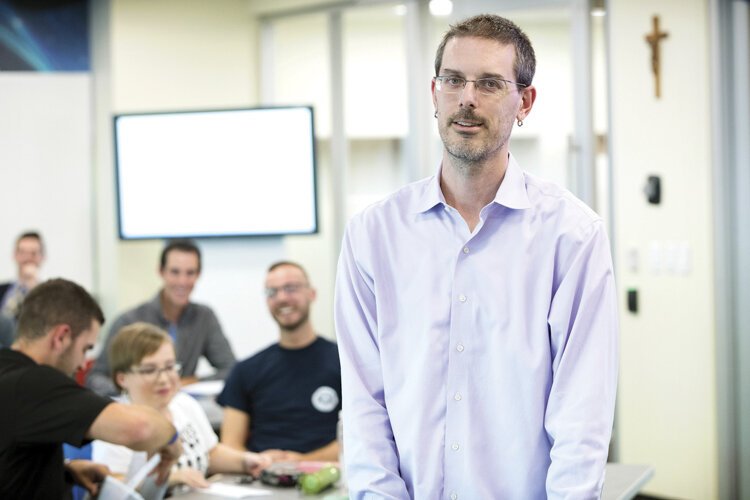 Doan Winkel, director of the Edward Muldoon Center for Entrepreneurship at John Carroll UniversityDoan Winkel, director of the Edward Muldoon Center for Entrepreneurship at John Carroll University
Doan Winkel, director of the Edward Muldoon Center for Entrepreneurship at John Carroll UniversityDoan Winkel, director of the Edward Muldoon Center for Entrepreneurship at John Carroll University
Much of the Jesuit Catholic education at John Carroll University is founded on community service work.
“Students at John Carroll do a ton of service work,” says Doan Winkel, John J. Kahl, Sr. Chair in Entrepreneurship
and director of the Edward Muldoon Center of Entrepreneurship at John Carroll University (JCU). “They have 140,000 hours of service work throughout the community each year.”So Winkel paired his entrepreneurial knowledge with JCU’s dedication to service to head the school’s Cleveland Neighborhoods Project—leveraging the resources of the JCU community to address poverty, inequality, and civic disengagement in specific Cleveland neighborhoods.
The initiatives engage youth to collaboratively develop solutions so they can experience ownership of the results. “[I thought] it could be valuable to focus some of that energy into one neighborhood, and go really deep,” Winkel says. “We’d develop the process and then go into other neighborhoods.”
Now in its first year, volunteers with the Neighborhoods Project are at work in the Buckeye, Shaker Square, and Larchmere neighborhoods. Working in part with a $50,000 Verizon Innovative Learning program grant, the group is doing everything from working with creative agency Recess Cleveland to pass out activity buckets full of games, activities, and family projects, to conducting walkability assessments with Mac Love of Akron-based Art x Love.
“The walkability assessment is a comprehensive evaluation of roadways, sidewalks, greenery, and safety,” explains Winkel. “Students and residents are walking the neighborhood over a number of weeks with cameras and will put together a report. We can then take that report to the city and help make recommendations about where to use resources more efficiently.”
Mac Love is also working on digital activity books with a multi-cultural element to help residents identify creative and public art projects the entire community can get involved with. “We want to turn some of their creativity and ideas into a reality they get to see on a daily basis,” says Winkel. “It gives community pride, neighborhood pride.”
Another group is working with neighborhood teenagers on financial literacy and marketing. With $10,000, the groups must ultimately pitch their community-building ideas to the other groups and decide how to use the money. “We’re coming into the neighborhood and bringing a lot of resources—both financial and human capital—and building on ideas," explains Winkel.
And Winkel says the JCU students are learning quite a bit in the process. “It’s an opportunity to say, ‘Okay, you’re learning these things in the classroom. Now we have a lot of boots on the ground, let's get these ideas into action,’” he says. “We want to bring in more community partners and put the process together [to develop] a playbook on ‘Here’s how to do XYZ.’”
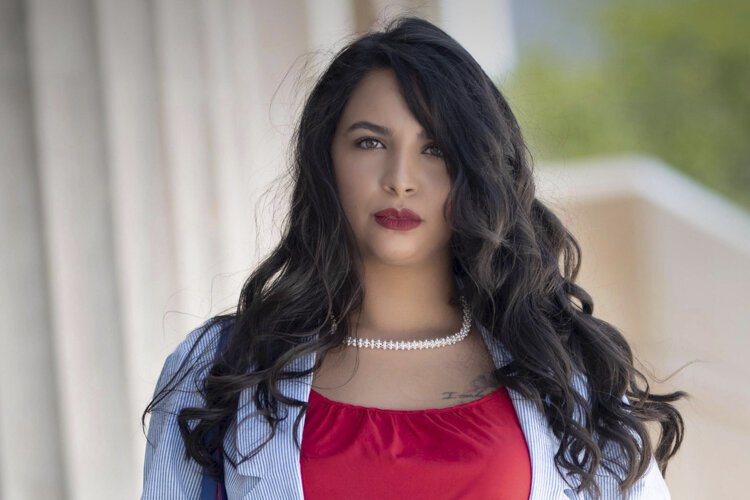 Alysha Ellis and Jasmin Santana, co-founders of SEEDS (Support, Empower, Engage, Develop, Sustain), a women’s empowerment program offered by Freshly Rooted
Alysha Ellis and Jasmin Santana, co-founders of SEEDS (Support, Empower, Engage, Develop, Sustain), a women’s empowerment program offered by Freshly Rooted
Six years ago, Alysha Ellis and her mother, Yolanda Ramos, co-founded Freshly Rooted—an organization that partners with MetroHealth System to teach good lifestyle choices.
“We utilize our own stories of health and wellness to make lifestyle choices,” explains Ellis. “To grow the impact of what we do, we [implemented] personalized coaching, group wellness, and groups around community engagement issues.”
Freshly Rooted has been so successful that Ellis and co-founder (and Ward 14 councilperson) Jasmin Santana launched the women’s empowerment program SEEDS (Support, Empower, Engage, Develop, Sustain).
SEEDS uses an innovative approach to community engagement aimed at creating a community of women equipped with the necessary leadership skills to make economic, healthy, and other meaningful changes that can sustain themselves, their families, and their communities.
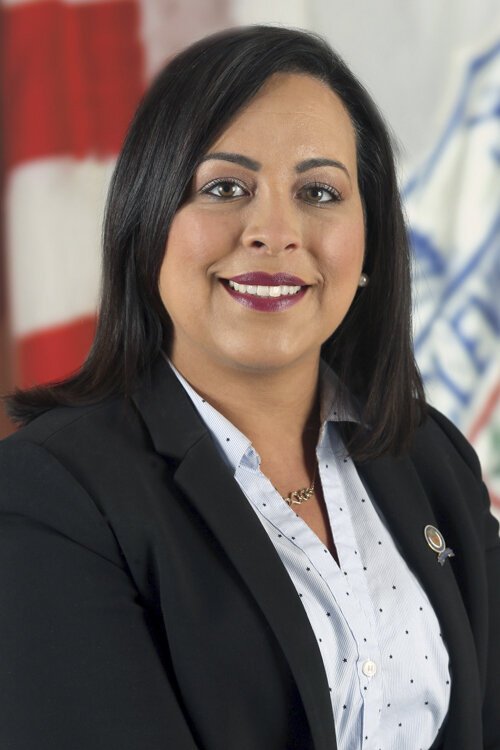 Jasmin Santana“All of it is designed to create a program for historically marginalized women who are facing obstacles or trauma [and providing] seeds for women looking for an opportunity,” explains Ellis. “Our mission is to provide equitable opportunities that equip women with the necessary skills so they can become self-sustainable.”
Jasmin Santana“All of it is designed to create a program for historically marginalized women who are facing obstacles or trauma [and providing] seeds for women looking for an opportunity,” explains Ellis. “Our mission is to provide equitable opportunities that equip women with the necessary skills so they can become self-sustainable.”
Ellis says the program is for anyone who is looking to grow personally, professionally, or socially. She also says incentives are offered to reach goals. “In the first group, every woman walked away with a desktop computer,” says Ellis.
The first cohort of SEEDS women began the nine-month series last spring and graduated in February. “The graduates from the first cohort are just rock stars,” says Ellie. “One graduate created a community garden during the pandemic and had 100 people come. The [group] learned what they want, what they need.”
The next series begins today, Sept. 2, and will be divided into six four-week classes, which can be taken separately or all together. Women who commit to all six classes in the series will also receive incentives, says Ellis.
SEEDS will start accepting applications for the next nine-month series in January, February, and March of 2021, with the courses beginning in the spring. For now, the SEEDS series will be offered online because of the pandemic.


